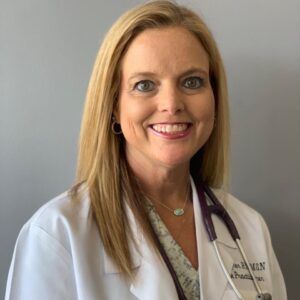 Written by: Jennie Gunn Ph.D., FNP-BC, CTN-A, Professor, University of South Alabama, President of TCNS International-Board of Trustees
Written by: Jennie Gunn Ph.D., FNP-BC, CTN-A, Professor, University of South Alabama, President of TCNS International-Board of Trustees
We all have stories about Covid-19. Many of us have cared for a person with Covid-19, had the virus or know someone with it. Many have lost family members. Covid-19 has been called dark, scary, and deadly. This is true in the small town where I live. The whole town is closed except for essential services. The clinics and the hospital are busy treating patients and fielding calls. This blog is about a small-town clinic about 30 miles away. How amazing are the nurse practitioner, nurses, and staff members out there doing what they do best, providing care. Travel with me to Holly Springs, Mississippi to visit a small clinic.
Holly Springs is a beautiful small town in Marshall County in North Mississippi. Rich in culture and charm, Holly Springs is known for the beautiful old homes shaded by the towering, old trees and its historic city square. The population of Holly Springs is approximately 7,652 and is mostly African American (78.6%) (U.S. Census Bureau, 2019). The median household income was approximately $27,630 in 2018 (2019). Located just below Memphis, between Tupelo and Tunica, the town is known for the Annual Pilgrimage in April and the Christmas Home tours. Holly Springs also has famous establishments like the Ida B. Wells Museum and Rust College (City of Holly Springs, n.d.).
Before the arrival of COVID-19 in early 2020, the Marshall Urgent Care Clinic staff in Holly Springs welcomed patients they knew to the clinic every day. The nurse practitioner and owner of the clinic, Tina Joyner Esmon and her office manager, staff, and nurses, know the area well and most of the people who live there. Residents of Holly Springs are family to the clinic personnel.
Before Covid-19, a typical clinic day consisted of 30 to 40 patients coming in for acute and chronic illnesses and various procedures such as x-rays and lab tests. Healthy patients also entered the freshly painted clinic and chatted with the welcoming registration staff, waiting for their well check-ups. Students were actively engaged in the clinic alongside the nurses and practitioners. The small town continued to be peaceful, beautiful, and welcoming.
In January 2020, everything began to change as the virus sweeping the Wuhan Province in China became world news. There seemed to be no stopping this ravishing virus. America took note, and small-town Mississippi began to look toward the influx of patients who thought they might have the virus. In order to protect the staff and patients, telemedicine was allowed with established patients through the order of the Governor Reeves. Now, instead of the welcoming clinic staff and the clean waiting room, patients called in on a system and could see and talk to the provider. Fear edged into the community, and worry entered the clinic. However, each day, the staff came to work to do what they could. This is their calling, Mrs. Joyner said. And then, on March 17th, the clinic doors were closed, and another new era began.
The glass doors at the front of the clinic now have a sign that instructs patients regarding how to be seen. In large print it reads, “Stop, Please, do not enter. Call the clinic, and the staff will come to you.” This is a whole new way of delivering and receiving care. The nurse or admission person goes to the car, completes necessary paperwork, collects the insurance card and driver’s license, and does what she can to help the patient. The cards are sprayed with a cleaning agent before being scanned. Everything is cleaned. In full protective gear, the nurse practitioner goes to the car to see the patient. Assessment is sometimes difficult but is completed as possible. The process continues all day, dressing in protective gear, undressing, washing, spraying, wiping, and redonning the wear. A tent now sits outside the clinic to shelter these activities from the rain, cold wind, and sun.
For those requiring an x-ray or procedure, the patient is gloved and masked, the procedure is quickly accomplished, and the patient is back in their car. With each entry, the clinic is cleaned when the patient walks out. Telemedicine has helped greatly, as many things, like refills, can be accomplished on a cell phone. The days are trying and long, but the staff and provider believe in the mission of caring for others.

When the day ends, the staff is mentally and emotionally exhausted. The staff gives so much to care for the community, their extended family. Others do know what the staff is sacrificing to keep them healthy. A state senator brought them a box of masks-supplies are always low. Stores in town provided tents for the clinic, a local restaurant gave the clinic a box of gloves, and others support the clinic staff in various ways.
The days have changed. Clinic life has changed. Nothing remains the same except for the staff’s drive to care and to do a good job. Tears sometimes come as the staff realizes the situation may worsen, patients will still drive up in their cars, and the phone will ring. Patients are afraid; everyone is worried.
As the staff leaves in the afternoon, they change clothes outside their homes, wash with bleach, shower immediately, and see their children through the window because they fear they will give their children the virus.
And then, sometimes, they cry at night. Such as life for this staff in the Marshall Urgent Care Clinic in Holly Springs, Mississippi and across the United States. How much do we owe you as the public? No one can count what is owed. Nurses doing their jobs, not backing down in fear, but always caring for their extended families in their town. Thank you to those who serve.
References
City of Holly Springs (n.d.). https://hollyspringsmsus.com
U.S. Census Bureau QuickFacts (2020). U.S. Department of Commerce. https://www.census.gov/quickfacts/hollyspringscitymississippi
